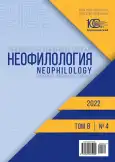The synthesis specificity of folklore and orthodox code in Y. Voznesenskaya’s novel “The Star Chernobyl”
- Authors: Osmukhina O.Y.1, Beloglazova E.A.1
-
Affiliations:
- National Research Ogarev Mordovia State University
- Issue: Vol 8, No 4 (2022)
- Pages: 772-785
- Section: RUSSIAN LITERATURE AND LITERATURE OF PEOPLES OF RUSSIAN FEDERATION
- URL: https://journal-vniispk.ru/2587-6953/article/view/301686
- DOI: https://doi.org/10.20310/2587-6953-2022-8-4-772-785
- ID: 301686
Cite item
Full Text
Abstract
Y. Voznesenskaya’s novel “The Star Chernobyl” is analyzed through the prism of the folklore code. The novel, built as a synthesis of fiction and non-fiction and telling about the first weeks after the Chernobyl disaster, connects the biblical context and the story of a small family, unfolding in real historical conditions according to the scheme of a fairy tale narrative. We establish that the epigraph to the novel does not just “rhyme” with the plot deployment, but, firstly, sets the key theme of the narrative (Chernobyl disaster), and secondly, it makes it possible to discover the commonality of the ongoing processes in biblical times and in modern times, forcing the reader invariably correlate what is happening in the present and in the distant past at each new round of phantasmagoric action. It expands the theme of novel to a global, universal scale, immerses it in the context of biblical imagery (Chernobyl accident as the beginning of the Apocalypse, a universal catastrophe) and acquires the functions of a contextual link that connects not just epochs, but modernity with eternity, everyday life with existence. The Orthodox context of novel is embodied in the motifs of forgiveness, catholicity, sacrificial love, as well as in the figurative system, where two types of righteous hero are presented: if the main character is a “doubted righteous man” who follows the faith through trials, personal disappointments and losses, then her Sister Anna is comparable to righteous wanderers (she is not ideal, she has worldly vices, but she devoutly believes in God, does not deviate from her own convictions, and in the finale is ready for a truly sacrificial act, refusing personal happiness for the sake of saving orphans).
Keywords
About the authors
O. Y. Osmukhina
National Research Ogarev Mordovia State University
Email: osmukhina@inbox.ru
ORCID iD: 0000-0002-1456-4793
Doctor of Philology, Professor, Head of Russian and Foreign Literature Department
68/1 Bolshevistskaya St., Saransk 430005, Republic of Mordovia, Russian FederationE. A. Beloglazova
National Research Ogarev Mordovia State University
Author for correspondence.
Email: e.a.beloglazo-va@yandex.ru
ORCID iD: 0000-0001-6198-1365
Post-Graduate Student, Russian and Foreign Literature Department
68/1 Bolshevistskaya St., Saransk 430005, Republic of Mordovia, Russian FederationReferences
- Gagayev A.A., Gagayev P.A. Pravoslaviye i russkaya literatura (teoriya i praktika prochteniya khudozhestven-nogo teksta na kul’turno-istoricheskoy osnove) [Orthodoxy and Russian Literature (Theory and Practice of Reading a Literary Text on a Cultural and Historical Basis)]. Moscow, St. Petersburg, Publishing House “Mir”, 2012, 288 p. (In Russian).
- Bocharov S.G. O religioznoy filologii [About religious philology]. Literaturovedeniye kak problema: trudy Nauchnogo soveta «Nauka o literature v kontekste nauk o kul’ture» [Literary Studies as a Problem: Proceedings of the Scientific Council “Science of Literature in the Context of Cultural Sciences”]. Moscow, Nasledie Publ., 2001, pp. 483-499. (In Russian).
- Nefagina G.L. Russkaya proza kontsa XX veka [Russian Prose of the Late 20th Century]. Moscow, Flinta: Nauka Publ., 2005, 320 p. (In Russian).
- Ageyev A. Na ulitse i v khrame [On the street and in the temple]. Znamya – The Banner, 1990, no. 10, pp. 228-237. (In Russian).
- Soldatkina Y.V. Sovremennaya slovesnost’: aktual’nyye tendentsii v russkoy literature i zhurnalistike [Modern Literature: Current Trends in Russian Literature and Journalism]. Moscow, Moscow Pedagogical State Universi-ty Publ., 2015, 160 p. (In Russian).
- Ponomareva E.V. Russkaya novellistika 1920-kh godov (osnovnyye tendentsii razvitiya): dis. … d-ra filol. nauk [Russian Novelistic of the 1920s (Main Development Trends). Dr. philol. sci. diss.]. Yekaterinburg, 2006, 490 p. (In Russian).
- Propp V.Y. Istoricheskie korni volshebnoy skazki [Historical Roots of a Fairy Tale]. St. Petersburg, Azbuka, Azbuka-Attikus Publ., 2021, 544 p. (In Russian).
- Shmeman A. Za zhizn’ mira [For the Life of the World]. Moscow, Church of the Holy Martyr Tatiana Publ., 2003, 112 p. (In Russian).
- Florenskiy P.A. Stolp i utverzhdeniye Istiny [Pillar and Ground of Truth]. In: Florenskiy P.A. Sochineniya: v 2 t. [Works: in 2 vols.]. Moscow, Pravda Publ., 1991, vol. 1, 493 p. (In Russian).
- Trubetskoy E.N. Tri ocherka o russkoy ikone [Three Essays on the Russian Icon]. Novosibirsk, “Siberia 21st Century” Publ., 1991, 110 p. (In Russian).
- Ternovskaya E.A. Problema pravednichestva v proze N.S. Leskova 1870–1880-kh godov: dis. … kand. filol. nauk [The Problem of Righteousness in the Prose of N.S. Leskov in the 1870s–1880s. Cand. philol. sci. diss.]. Michurinsk, 2006, 213 p. (In Russian).
- Ilin I.A. Pobedit pravoye delo [The right cause will win]. Literaturnaya Rossiya [Literary Russia], 1991, no. 15. (In Russian).
- Dvoyeglazov V.V. Kategoriya «pravednichestva» v russkoy literature pervoy poloviny XIX veka: dis. … kand. filol. nauk [The Category of “Righteousness” in Russian Literature of the First Half of the 19th Century. Cand. philol. sci. diss.]. Kirov, 2015, 241 p. (In Russian).
- Nichiporov B.V. Vvedeniye v khristianskuyu psikhologiyu. Razmyshleniya svyashchennika-psikhologa [Introduction to Christian Psychology. Reflections of a Priest-Psychologist]. Moscow, Shkola-Press, 1994, 192 p. (In Russian).
Supplementary files









